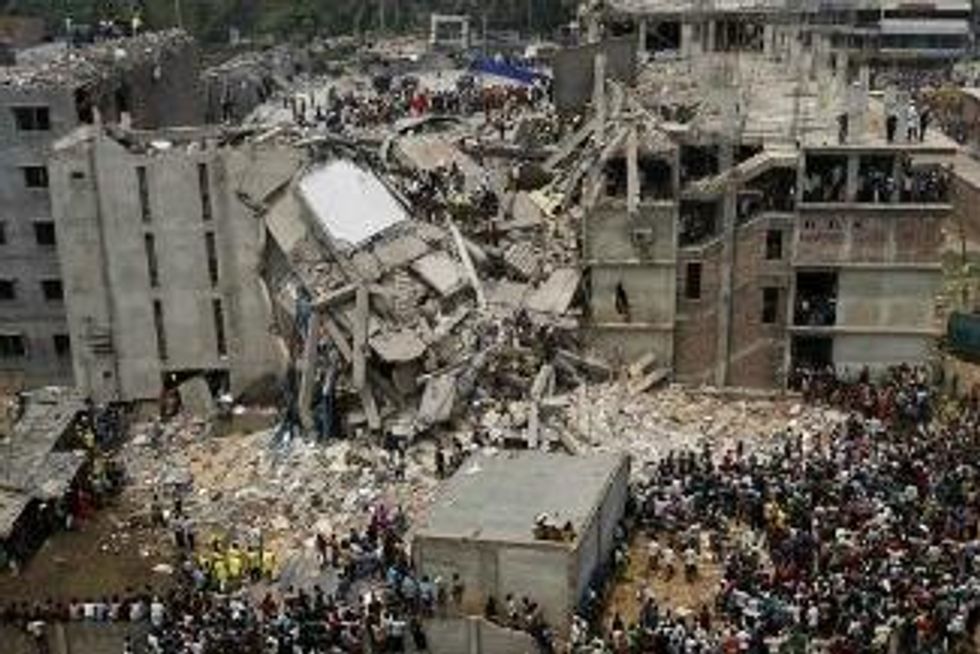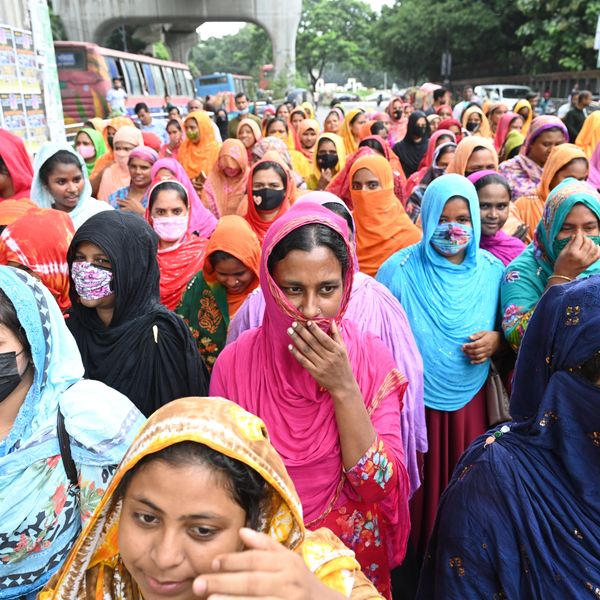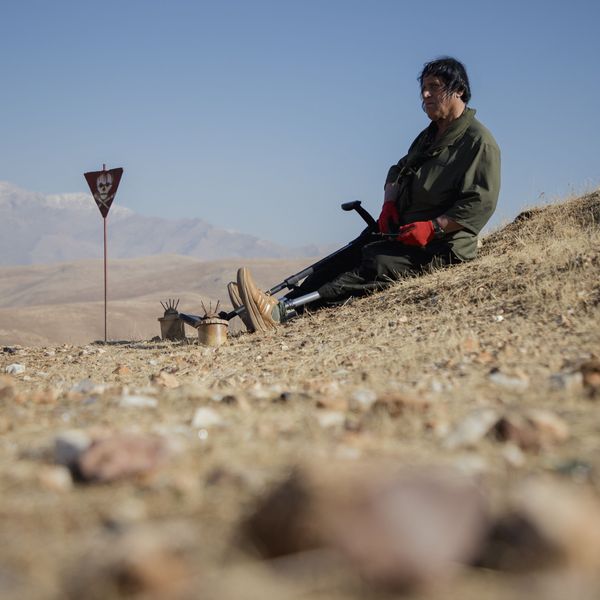At Ruins of Bangladesh Factory, the Wounded and Grieving Demand Justice
Rallies and vigils take place around the world on anniversary of worst industrial disaster in Bangladesh's history
Marking the one year anniversary of Bangladesh's Rana Plaza tragedy, thousands of survivors, family members of the dead and missing, and their supporters marched Thursday on the ruins of the collapsed factory that killed at least 1,135 garment workers and injured over 2,500.
Some protesters donned funeral shrouds, and cries of "We want compensation!" and "Death to Sohel Rana!" (the building's owner) echoed throughout the crowd, The Guardian reports. Numbered among them were injured survivors, as well as loved ones of the more than 140 workers still missing--including young children holding photographs of missing parents. One protester held a sign that reads "We want rights, not kindness. We demand a safe workplace, not a death trap."
Humayun Kabir of the South Asia Solidarity Initiative told Common Dreams that garment workers' oganization Garment Shamhati and the Pathala South Asian Media Institute organized art exhibitions at numerous sites around Dhaka on Thursday, including the Rana Plaza ruins, memorializing the tragedy.

Demonstrations also shook the Dhaka headquarters of an organization of garment manufacturers, and labor organizations have deemed Thursday a global day of action to demand "justice for Rana Plaza victims." Solidarity rallies and events are planned Thursday in 50 countries across the world, according to Al Jazeera America.
This includes an evening memorial in New York City's Union Square, which will incorporate images from the art exhibits around Dhaka and conclude with a march to the site of the Triangle Shirtwaist Factory Fire of 1911.
"Very little has actually been done to change the situation that led to the disaster a year ago," said Kabir, one of the organizers of the New York vigil. "There have been a lot of people struggling to get compensation for victims and trying to change business practices of international buyers and practices of factory owners. One of the ways we can keep these issues on the agenda is by saying that this disaster that happened is not a distant memory. We shouldn't forget about it."
The collapse of the nine-story building, located in the greater Dhaka area, is the worst garment industry tragedy in Bangladeshi history. It followed the Tazreen factory fire that killed over 100 workers.
The disaster sparked record worker protests and shined an international spotlight light on the rampant abuse, dangerous conditions, and retaliation for organizing faced by Bangladesh's estimated 4 million garment workers, 80 percent of whom are women from rural areas.
It also exposed the complicity of numerous Western retail corporations that do business with Bangladeshi garment factories and, critics charge, drive the industry's dismal conditions and wages.
Responding to negative publicity, half of the nearly 30 western brands directly tied to Rana Plaza factories paid approximately million into a fund that issued compensation this week of $640 a piece to survivors and families of those killed. Some companies, including Benetton and J.C. Penney, have contributed nothing to the fund, and some of the wounded say they still haven't seen any money.
Farah Kabir, Bangladesh Country Director of human rights and anti-poverty group ActionAid, slammed the payouts as "pocket money," charging that it is "offensive that some multinational companies think that small, sporadic cash hand-outs are the same as a lifetime's earnings."
An ActionAid survey of 1436 survivors and 768 family members of the dead found that, one year after the Rana Plaza disaster, a majority of survivors are "struggling to pay for food, rent, and outstanding debts while awaiting full compensation" and three quarters are "too traumatized or injured to return to work."
_____________________
An Urgent Message From Our Co-Founder
Dear Common Dreams reader, The U.S. is on a fast track to authoritarianism like nothing I've ever seen. Meanwhile, corporate news outlets are utterly capitulating to Trump, twisting their coverage to avoid drawing his ire while lining up to stuff cash in his pockets. That's why I believe that Common Dreams is doing the best and most consequential reporting that we've ever done. Our small but mighty team is a progressive reporting powerhouse, covering the news every day that the corporate media never will. Our mission has always been simple: To inform. To inspire. And to ignite change for the common good. Now here's the key piece that I want all our readers to understand: None of this would be possible without your financial support. That's not just some fundraising cliche. It's the absolute and literal truth. We don't accept corporate advertising and never will. We don't have a paywall because we don't think people should be blocked from critical news based on their ability to pay. Everything we do is funded by the donations of readers like you. Will you donate now to help power the nonprofit, independent reporting of Common Dreams? Thank you for being a vital member of our community. Together, we can keep independent journalism alive when it’s needed most. - Craig Brown, Co-founder |
Marking the one year anniversary of Bangladesh's Rana Plaza tragedy, thousands of survivors, family members of the dead and missing, and their supporters marched Thursday on the ruins of the collapsed factory that killed at least 1,135 garment workers and injured over 2,500.
Some protesters donned funeral shrouds, and cries of "We want compensation!" and "Death to Sohel Rana!" (the building's owner) echoed throughout the crowd, The Guardian reports. Numbered among them were injured survivors, as well as loved ones of the more than 140 workers still missing--including young children holding photographs of missing parents. One protester held a sign that reads "We want rights, not kindness. We demand a safe workplace, not a death trap."
Humayun Kabir of the South Asia Solidarity Initiative told Common Dreams that garment workers' oganization Garment Shamhati and the Pathala South Asian Media Institute organized art exhibitions at numerous sites around Dhaka on Thursday, including the Rana Plaza ruins, memorializing the tragedy.

Demonstrations also shook the Dhaka headquarters of an organization of garment manufacturers, and labor organizations have deemed Thursday a global day of action to demand "justice for Rana Plaza victims." Solidarity rallies and events are planned Thursday in 50 countries across the world, according to Al Jazeera America.
This includes an evening memorial in New York City's Union Square, which will incorporate images from the art exhibits around Dhaka and conclude with a march to the site of the Triangle Shirtwaist Factory Fire of 1911.
"Very little has actually been done to change the situation that led to the disaster a year ago," said Kabir, one of the organizers of the New York vigil. "There have been a lot of people struggling to get compensation for victims and trying to change business practices of international buyers and practices of factory owners. One of the ways we can keep these issues on the agenda is by saying that this disaster that happened is not a distant memory. We shouldn't forget about it."
The collapse of the nine-story building, located in the greater Dhaka area, is the worst garment industry tragedy in Bangladeshi history. It followed the Tazreen factory fire that killed over 100 workers.
The disaster sparked record worker protests and shined an international spotlight light on the rampant abuse, dangerous conditions, and retaliation for organizing faced by Bangladesh's estimated 4 million garment workers, 80 percent of whom are women from rural areas.
It also exposed the complicity of numerous Western retail corporations that do business with Bangladeshi garment factories and, critics charge, drive the industry's dismal conditions and wages.
Responding to negative publicity, half of the nearly 30 western brands directly tied to Rana Plaza factories paid approximately million into a fund that issued compensation this week of $640 a piece to survivors and families of those killed. Some companies, including Benetton and J.C. Penney, have contributed nothing to the fund, and some of the wounded say they still haven't seen any money.
Farah Kabir, Bangladesh Country Director of human rights and anti-poverty group ActionAid, slammed the payouts as "pocket money," charging that it is "offensive that some multinational companies think that small, sporadic cash hand-outs are the same as a lifetime's earnings."
An ActionAid survey of 1436 survivors and 768 family members of the dead found that, one year after the Rana Plaza disaster, a majority of survivors are "struggling to pay for food, rent, and outstanding debts while awaiting full compensation" and three quarters are "too traumatized or injured to return to work."
_____________________
Marking the one year anniversary of Bangladesh's Rana Plaza tragedy, thousands of survivors, family members of the dead and missing, and their supporters marched Thursday on the ruins of the collapsed factory that killed at least 1,135 garment workers and injured over 2,500.
Some protesters donned funeral shrouds, and cries of "We want compensation!" and "Death to Sohel Rana!" (the building's owner) echoed throughout the crowd, The Guardian reports. Numbered among them were injured survivors, as well as loved ones of the more than 140 workers still missing--including young children holding photographs of missing parents. One protester held a sign that reads "We want rights, not kindness. We demand a safe workplace, not a death trap."
Humayun Kabir of the South Asia Solidarity Initiative told Common Dreams that garment workers' oganization Garment Shamhati and the Pathala South Asian Media Institute organized art exhibitions at numerous sites around Dhaka on Thursday, including the Rana Plaza ruins, memorializing the tragedy.

Demonstrations also shook the Dhaka headquarters of an organization of garment manufacturers, and labor organizations have deemed Thursday a global day of action to demand "justice for Rana Plaza victims." Solidarity rallies and events are planned Thursday in 50 countries across the world, according to Al Jazeera America.
This includes an evening memorial in New York City's Union Square, which will incorporate images from the art exhibits around Dhaka and conclude with a march to the site of the Triangle Shirtwaist Factory Fire of 1911.
"Very little has actually been done to change the situation that led to the disaster a year ago," said Kabir, one of the organizers of the New York vigil. "There have been a lot of people struggling to get compensation for victims and trying to change business practices of international buyers and practices of factory owners. One of the ways we can keep these issues on the agenda is by saying that this disaster that happened is not a distant memory. We shouldn't forget about it."
The collapse of the nine-story building, located in the greater Dhaka area, is the worst garment industry tragedy in Bangladeshi history. It followed the Tazreen factory fire that killed over 100 workers.
The disaster sparked record worker protests and shined an international spotlight light on the rampant abuse, dangerous conditions, and retaliation for organizing faced by Bangladesh's estimated 4 million garment workers, 80 percent of whom are women from rural areas.
It also exposed the complicity of numerous Western retail corporations that do business with Bangladeshi garment factories and, critics charge, drive the industry's dismal conditions and wages.
Responding to negative publicity, half of the nearly 30 western brands directly tied to Rana Plaza factories paid approximately million into a fund that issued compensation this week of $640 a piece to survivors and families of those killed. Some companies, including Benetton and J.C. Penney, have contributed nothing to the fund, and some of the wounded say they still haven't seen any money.
Farah Kabir, Bangladesh Country Director of human rights and anti-poverty group ActionAid, slammed the payouts as "pocket money," charging that it is "offensive that some multinational companies think that small, sporadic cash hand-outs are the same as a lifetime's earnings."
An ActionAid survey of 1436 survivors and 768 family members of the dead found that, one year after the Rana Plaza disaster, a majority of survivors are "struggling to pay for food, rent, and outstanding debts while awaiting full compensation" and three quarters are "too traumatized or injured to return to work."
_____________________

